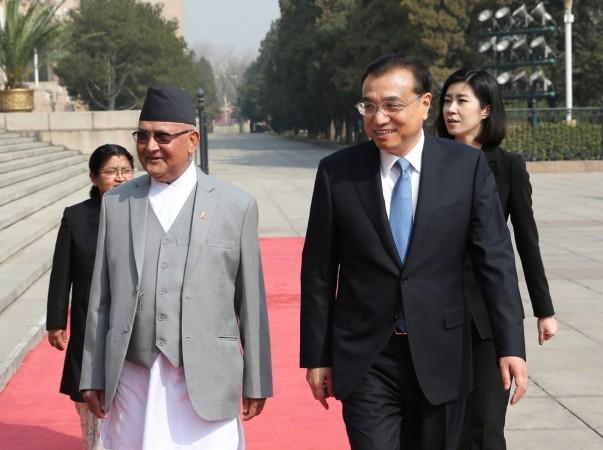
India's long-held monopoly in offering its seaports to landlocked Nepal is expected to be challenged by China, reported Reuters. Nepal's Prime Minister KP Sharma Oli signed an agreement with his Chinese counterpart Li Keqiang in Beijing this week giving Nepalese traders access to Chinese seas to trade with the world.
"This is a historic agreement for Nepal," Rabi Shankar Sainju, the country's minister for commerce, told Reuters in Kathmandu. "This cannot be an alternative to the Indian port but it is an additional route to boost our trade," he added.
The Federation of Nepalese Chambers of Commerce and Industry (FNCCI) told Reuters Nepal does not have the prerequisite road and rail connectivity to reach Chinese seaports, which are more than 3,000 kilometres away from its border.
However, a Nepalese official in Kathmandu told the news agency the routes and ports would be decided soon. Bhawani Rana, the senior official, was quoted as saying: "Theoretically it is a good thing. But we have to do a lot of work before we can actually use the Chinese route."
Any connectivity deal between the two neighbours separated by the Himalayas is a geographical and technical marvel, say analysts. The countries also signed a railway deal but it was limited to China helping Nepal construct railways inside its borders between three major cities. A cross-country rail link may be affected by the same Himalayan obstruction.
The Diplomat reported Oli voiced his support for China's One Belt, One Road initiative — a Chinese geoeconomic aspiration to expand its economic interconnectivity across the Eurasian landmass. A ramification of this was China agreeing to consider the feasibility of a cross-border rail network. However, it quoted a March 23 report as saying: "The planned rail link might involve the herculean task of tunneling under Mount Everest. [sic]"
Oli also secured transit rights for Nepali goods through China, which the Hindu reported would reduce Kathmandu's dependence on India's transiting routes to seaports. It quoted an Indian external affairs ministry official as saying: "After all, 98 percent of Nepal's third-country trade goes through India and to the port of Kolkata."
Reuters said the new Nepal-China connectivity and trade deal is a sign of the "impoverished" country's "lessening dependence on India."
A five-month Madhesi blockade protesting Nepal's new constitution at the country's borders with India had left the country short of fuel and goods in the winters. Nepal had said the protestors received India's support, something the latter has denied since the beginning.
India currently offers its Kolkata port for trade, but Nepal officials said it has become congested.
In his February 2016 visit to India, Oli had signed two pacts with Nepal, the Mint reported March 21. One was on "simplification of modalities for traffic of goods between Nepal and Bangladesh while transiting through India on the Kakarbhitta (Nepal) and Bangladesh corridor." The second was "to provide for transit facilities for Nepal through the Visakhapatnam port."

















